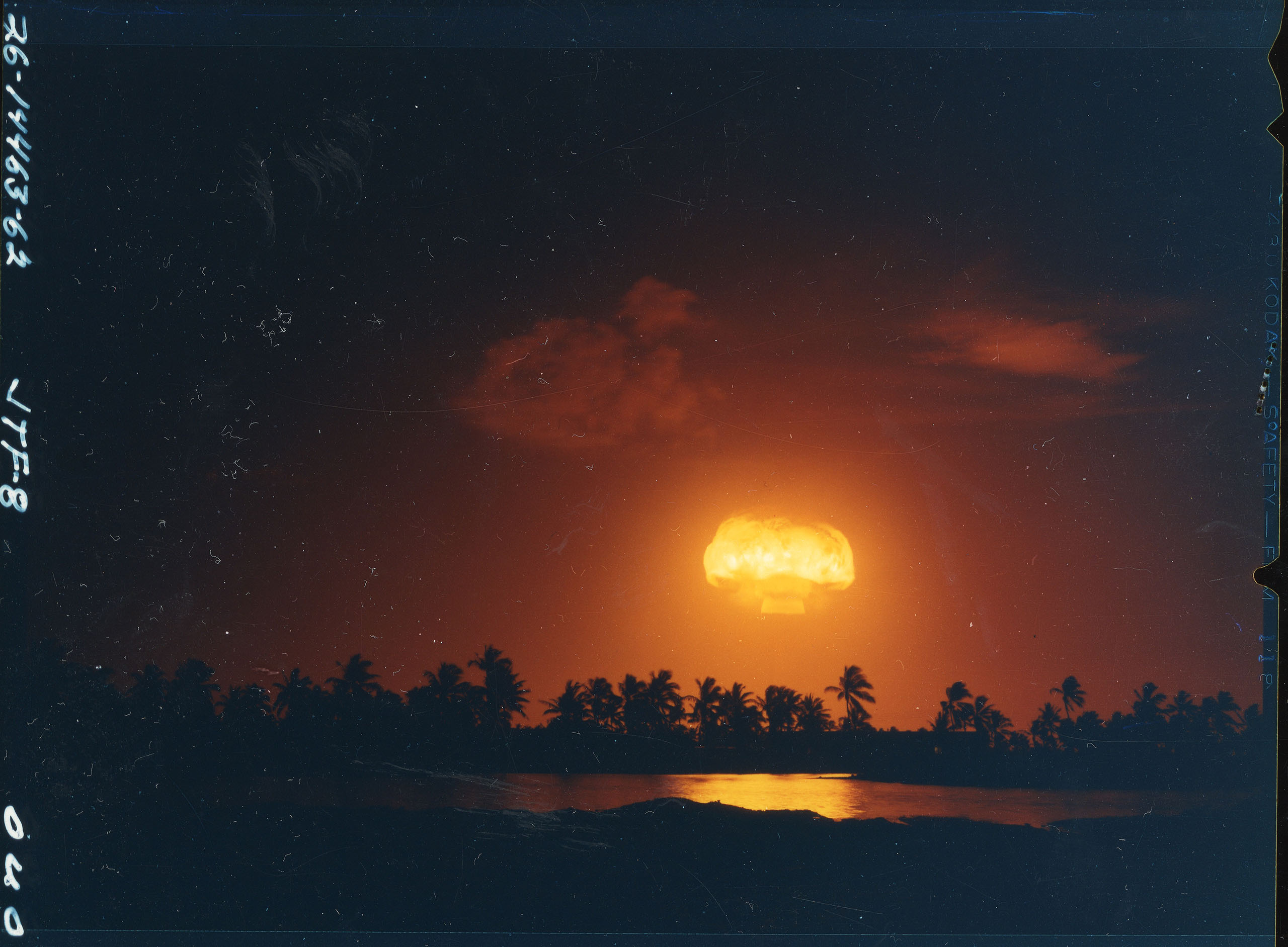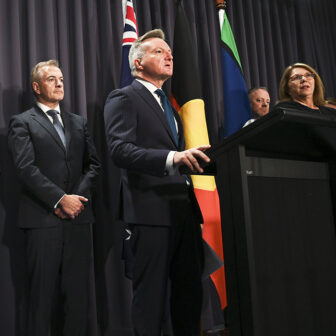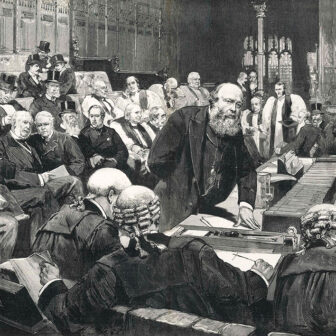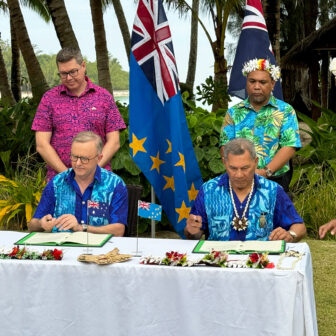Just three days before Christmas, the UN General Assembly adopted a resolution designed to assist survivors of nuclear testing and restore environments contaminated by nuclear weapons testing and use. Jointly developed by Kiribati and Kazakhstan, the resolution won overwhelming support, with 171 nations in favour, six abstentions and just four votes against.
It’s little surprise that five of the six abstentions came from nuclear weapon states: the United States, China, Israel, Pakistan and India (joined, oddly, by South Sudan). But in a dismaying display of power politics, France and Britain voted with Russia and North Korea to oppose assistance to people and landscapes irradiated during decades of nuclear testing.
Diplomats representing Western powers are prone to talk about “the international community,” “the rules-based order” and “democratic versus authoritarian states.” But on this occasion the jargon was undercut by the willingness of London and Paris to line up alongside Moscow and Pyongyang to avoid responsibility for past actions and to limit reparations.
With the International Court of Justice debating genocide in Ukraine, Myanmar and Palestine and UN agencies seeking to defend international humanitarian law, the hypocrisy of major powers has been polarising international opinion. Developing nations are increasingly challenging an international order that sanctions official enemies, at the same time as absolving major powers of the responsibility to deal with their own breaches of international law.
Over the past three years, ambassadors Teburoro Tito of Kiribati and Akan Rakhmetullin of Kazakhstan have coordinated international consultations on how the nuclear assistance provisions of the Treaty on the Prohibition of Nuclear Weapons, or TPNW, should be implemented. Articles 6 and 7 of the treaty, which entered into force in January 2021, include unprecedented obligations on parties to the treaty to aid nuclear survivors and contribute to environmental remediation.
Kiribati and Kazakhstan might seem an unlikely couple, but they have bonded over a common twentieth-century legacy. Both nations’ lands, waters and peoples have been devastated by cold war nuclear testing, and in each case the responsible countries refuse to take responsibility. Britain and Russia have bonded, too, but in their case, they’re united in their refusal to assist their former colonies.
After conducting twelve atmospheric atomic tests in Australia in 1952–57 — at the Monte Bello Islands, Emu Field and Maralinga — Britain sought a new location for developing and testing more powerful hydrogen bombs. During Operation Grapple, the British military conducted nine atmospheric thermonuclear tests at Malden and Christmas (Kiritimati) islands in the Gilbert and Ellice Islands Colony, which is today part of the Republic of Kiribati.
Just as Britain chose the “vast empty spaces” of the South Australian desert and the isolated atolls of Kiribati for its tests, Moscow sought similar expanses within the Union of Soviet Socialist Republics. Over more than four decades, it held 456 nuclear tests in the Semipalatinsk region of Kazakhstan. The history of Soviet testing in the Central Asian republic and its radioactive legacies, spread across more than 18,000 square kilometres, has been documented by Kazakh scholar Togzhan Kassenova in her compelling 2022 book Atomic Steppe.
Once the TPNW was adopted, Kiribati and Kazakhstan led efforts to develop mechanisms for dealing with the health and environmental effects of radioactive fallout. After seeking technical advice from survivors, nuclear scientists and UN agencies, they developed a set of proposals for action and a UN resolution seeking international support.
Now adopted by the UN General Assembly, that resolution proposes bilateral, regional and multilateral action and the sharing of technical and scientific information about nuclear legacies, and “calls upon Member States in a position to do so to contribute technical and financial assistance as appropriate.” It requires UN secretary-general Antonio Guterres to seek members’ views and proposals about assistance to nuclear survivors and report back to the General Assembly.
Like most non-binding UN resolutions, this one is couched in the cautious diplomatic terminology required to forge a consensus among 193 UN member states. How then do the French and British governments justify their vote against assistance to nuclear survivors, a decision echoed by Vladimir Putin and Kim Jong-un?
When I put questions to France’s ambassador to the Pacific, Véronique Roger-Lacan, the French foreign affairs ministry replied, justifying its decision to stand with North Korea and Russia “because this resolution does not recognise the efforts already undertaken and because it aims to establish an international liability regime which ignores ongoing bilateral or national efforts, to which we are committed.”
According to the ministry, the French “fully” assume their “responsibilities and do everything we can to compensate all victims of nuclear tests, in accordance with the law of 5 January 2010 relating to the recognition and compensation of victims of French nuclear tests, modified in 2017. In this respect, France has in recent years strengthened its human and financial resources allocated to managing the consequences of the tests, including the identification and assistance of potential victims.”
It’s true that in 2010 France established the Comité d’Indemnisation des Victimes des Essais Nucléaires, or CIVEN, a commission to evaluate compensation claims from civilian and military personnel who staffed French nuclear test sites. But CIVEN’s significant flaws mean it is disingenuous to suggest that successive governments are “managing the consequences of the tests.”
President Emmanuel Macron’s refusal to respond fully to demands for assistance have been widely condemned by Mā’ohi political, church and community leaders in French Polynesia, where France conducted 193 nuclear tests from 1966 until as recently as 1996. They note, for example, that during its first five years of operation CIVEN approved only 2 per cent of claims submitted by personnel exposed to hazardous levels of ionising radiation at Moruroa and Fangataufa atolls.
Changes to the law since 2017 have improved the compensation process, but CIVEN still rejects more than half of all applications. Political and community leaders in French Polynesia continue to push for further reforms as well as an apology for the ongoing trauma caused by thirty years of testing.
In 2022 the French government created a special Mémoire des Hommes website dedicated to the Mā’ohi Nui nuclear testing program and began declassifying some relevant documents. But only archives relating to the Pacific Testing Centre are eligible for declassification — not those that cover France’s atmospheric and underground tests in Algeria between 1960 and 1965. France used its North African colony to conduct four atmospheric nuclear tests at Reggane and thirteen underground tests at In Eker in the Sahara desert, tests that continuing three years beyond Algerian independence in 1962 to give Paris time to build its testing bases in the South Pacific.
Indigenous survivors and researchers from the Nuclear Truth Project continue to call for better access to nuclear archives and the release of the documentary evidence required for compensation programs. They have also developed protocols to ensure any efforts for remediation and assistance are focused on redress for both historic and future harms from nuclear activities.
December’s UN resolution is just one step in a longer campaign to deal with the humanitarian impacts of nuclear weapons under the TPNW. Seventy countries have now ratified that treaty, and the nuclear weapon states are getting anxious.
The United States, France and Britain — the three states that tested nuclear weapons in Oceania — first tried to ignore the TPNW, but as the number of ratifications mounted, they began to actively oppose it. In our region, eleven Pacific island countries and territories have ratified or acceded to TPNW and the remaining colonial dependencies have also joined the call for assistance to nuclear survivors, even though they can’t sign the treaty.
In September last year the Assembly of French Polynesia unanimously passed a resolution in support of the TPNW. As ICAN France, the local affiliate of the International Campaign to Abolish the Nuclear Weapons, noted, “while French Polynesia cannot currently access the assistance and rehabilitation outlined in Articles 6 and 7 of the TPNW due to France’s non-ratification, it sends a resounding message in favour of the treaty to Paris.”
President Moetai Brotherson of French Polynesia says the Assembly resolution sends an important message to Paris. “It’s not legally binding, so that’s probably one of the reasons they don’t really care about it,” Brotherson told me in November. “But it has a symbolic value that is very strong. For us, it’s only natural that we have this kind of position taken at the parliament. It’s a message we want to send to the world — that nuclear weapons are dangerous and we can destroy this planet if we are not cautious about it.”
In Australia, Kiribati, Marshall Islands and French Polynesia, Indigenous communities affected by nuclear testing want the weapons states to provide funds for independent, comprehensive radiological surveys of nuclear test sites and surrounding communities. They also want the nuclear powers to monitor, secure and remove nuclear wastes on a scale and standard comparable to the clean-up of domestic nuclear sites in their home territory.
As they ended their twentieth-century test programs, the Western powers used the Pacific Ocean as a dumping ground. A 2017 French government report on ocean dumping of nuclear waste admits that 2580 tonnes of nuclear waste in concrete drums was dumped in the ocean at site Oscar off Moruroa atoll in the eight years from 1974. Seventy-six tonnes of untreated radioactive waste had already been submerged at the nearby November site between 1972 and 1975.
ICAN France has also documented significant amounts of nuclear waste buried in the Sahara desert after France’s seventeen nuclear tests in Algeria, even though the French government still refuses to communicate details of the waste and landfill locations to Algerian authorities.
British nuclear test sites in the Monte Bello Islands and South Australian desert are also scarred with the radioactive legacies of atmospheric tests and the hundreds of experiments — including burning uranium and plutonium — conducted on the land of the Anangu people. The nuclear threat to these sacrifice zones is not over. Last year, Barngarla traditional owners won a long battle to protect their country and storylines from the proposed establishment of a radioactive waste on their land near Kimba in South Australia.
France’s answers to my questions about why it joined Russia and North Korea to vote against the Kiribati/Kazakhstan resolution might have been less than satisfactory, but British high commissions in the Pacific declined to respond at all.
Unlike France and the United States, Britain doesn’t have a compensation commission for survivors of nuclear testing. In fact, Britain has a shameful record of nuclear secrecy: in 2018, the National Archives withdrew public access to key files about British nuclear testing in Oceania.
Over more than thirty years, British, Australian, NZ and Fijian military veterans who served at British nuclear test sites in Kiribati and Australia have unsuccessfully lodged a series of cases and appeals before British courts and the European Court of Human Rights. They have sought damages under civil law for the illnesses they attribute to their service at nuclear test sites. Britain’s defence ministry has consistently opposed these claims, unfailingly appealing against lower court rulings that assisted veterans.
A fatal problem for the veterans is that they lack documentary evidence of rates of radioactive exposure for military personnel — evidence still buried in the British archives. Last month, the UK Daily Mirror reported how successive governments have maintained the cover-up, with government agencies refusing to release relevant data. “In 2018, the UK Ministry of Defence claimed it ‘had no information’ about blood testing during the nuclear trials,” the newspaper reported. “Last year the Atomic Weapons Establishment, an MoD agency, admitted it holds up to 5000 files, including a list of 150 specific documents mentioning blood and urine tests taken during the weapons program.”
At a time of warfare in Europe and the Middle East, the actions of these nuclear weapon states highlight their hypocrisy. As civilians are massacred in Ukraine and Gaza, developing nations are mobilising through the UN General Assembly, the International Court of Justice and the International Criminal Court to end a culture of impunity for states that declare themselves democratic. •




